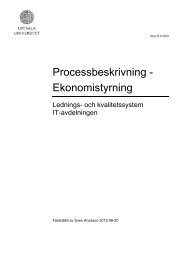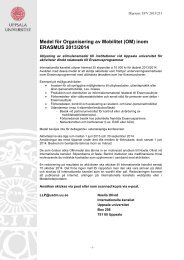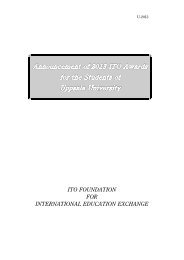Uppsala Universitet – International student guide 2012/2013
Uppsala Universitet – International student guide 2012/2013
Uppsala Universitet – International student guide 2012/2013
Create successful ePaper yourself
Turn your PDF publications into a flip-book with our unique Google optimized e-Paper software.
The university may seem rather large and<br />
difficult to get an overview of, but it is the department<br />
that will be your actual workplace.<br />
A department is a unit within the university<br />
where your classes and research take place<br />
within one subject, for example the Department<br />
of Mathematics, the Department of<br />
English, the Department of History, etc. It is<br />
the department that registers you when the<br />
programme or course begins. At the department<br />
you will find lecturers, study counsellors,<br />
course secretaries, director of studies,<br />
head of the department. This is where your<br />
instructions, lessons, some administrative services<br />
and any laboratories are held.<br />
Those that follow a longer programme<br />
can usually be expected to take several<br />
courses from other departments but usually<br />
have a “home” department in charge of<br />
the whole programme. Many departments<br />
work together in the same research and educational<br />
centres also called campus areas.<br />
Examples include Ekonomikum (business<br />
studies, economics, statistics, and more),<br />
Ångström Laboratory (technical, engineering,<br />
physics, chemistry and much more),<br />
<strong>Uppsala</strong> Biomedical Centre, mostly known<br />
as BMC (medical and pharmaceutical studies<br />
plus others).<br />
Teaching Methods<br />
Higher education at Swedish universities is<br />
mainly based on the tradition that <strong>student</strong>s<br />
take responsibility for their own studies<br />
with the support of the teaching faculty.<br />
The academic environment is informal<br />
You and Your StudIeS<br />
Your department = Your Workplace<br />
and interactive. Teaching is problem-based<br />
and carried out in different forms: lectures,<br />
seminars, group work, laboratory work, independent<br />
study, etc.<br />
Every degree programme and individual<br />
course has a syllabus that describes the<br />
learning outcomes and the content, the<br />
number of credits, learning activities, entry<br />
requirements, forms of assessment, grading<br />
system, organisation of the programme content<br />
and course requirements. These requirements<br />
are pre-determined and adopted by<br />
the faculty board in charge of the course.<br />
Disciplinary Procedures for Plagiarism,<br />
Cheating and Obstruction<br />
Students are expected to uphold the standards<br />
of academic honesty at <strong>Uppsala</strong> University.<br />
Plagiarism and cheating are treated<br />
very seriously. Invigilators at the examinations<br />
will check on <strong>student</strong>s and proven or<br />
suspected cheating will be reported to a<br />
Disciplinary Committee. At the hearing, a<br />
<strong>student</strong> may receive a warning or, at worst,<br />
be suspended from classes and other university<br />
activity for a period of time.<br />
This is the same procedure for suspected<br />
plagiarism, i.e. copying parts of someone<br />
else’s essay or publication and presenting it<br />
as your own. Plagiarism is generally defined<br />
as using someone else’s text or idea without<br />
a clear reference to the original source.<br />
If you are unsure about how to correctly<br />
cite sources in academic writing, be sure to<br />
consult your teacher or advisor to avoid any<br />
misunderstandings.<br />
31





